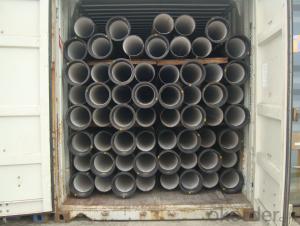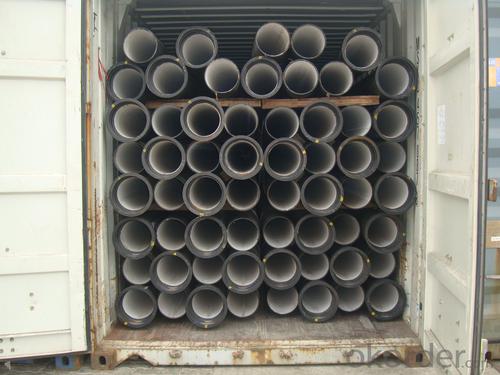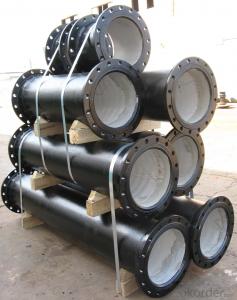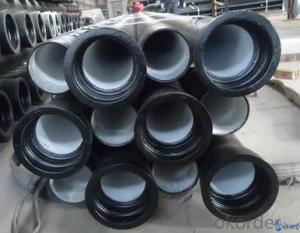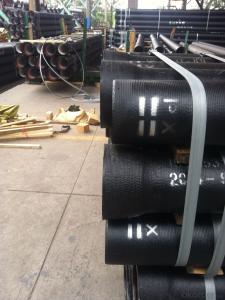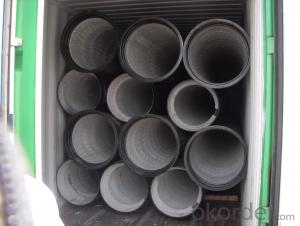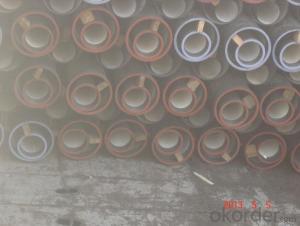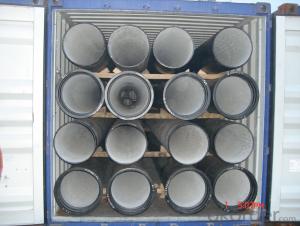DUCTILE IRON PIPES AND PIPE FITTINGS K8CLASS DN900
- Loading Port:
- Tianjin
- Payment Terms:
- TT OR LC
- Min Order Qty:
- 22 pc
- Supply Capability:
- 3000 pc/month
OKorder Service Pledge
OKorder Financial Service
You Might Also Like
Material : Ductile Cast Iron
Size Range : DN 80mm to DN 2000mm
Unit Effective Length : 6m or 5.7m
Manufacture Standard: ISO 2531:1998/ EN 545:2006/EN 598:2007
Annual capacity : 200,000 tons
Coating Exterior: Zinc 130g/m2 according to ISO 8179-1 and bitumen coating 70 microns.
Cement Interior: Portland Cement/ High Alumina Cement/ Sulphate Resisting Cement Lining according to ISO 4179
Special requirements on external coating and internal lining can be applied
We also provide accessories such as SBR/EPDM rubber gaskets, lubricant paste, pipe caps, PE sleeves, etc.
Additional Parts:
Each pipe is strictly inspected according to related standard to ensure permanently high performance.
Easy Installation at site and service free for life
Long Service Lifespan
Quotation will arrive you within 24hours once we get your inquiry.
We guarantee offering you a competitive price.
A copy of original inspection reports of pipes will be offered after shipment.
Photos of loading process will be sent to the customer after shipment effect.
We will follow-up the delivery progress after shipment effect and update to the customer on weekly basis.
- Q: Are ductile iron pipes suitable for use in paper mills?
- Ductile iron pipes, known for their strength and durability, are well-suited for paper mills. With their excellent performance in various industrial settings, including paper mills, these pipes are able to withstand high-pressure systems and resist corrosion. This makes them suitable for transporting water, chemicals, and other fluids commonly used in paper mills. Moreover, the impact resistance of ductile iron pipes is advantageous in an environment with heavy machinery and equipment. In summary, ductile iron pipes are a dependable and enduring choice for paper mills, thanks to their strength, durability, corrosion resistance, and ability to handle high-pressure systems.
- Q: Fire water supply network adopts ductile iron pipe, the test pressure should be no more than MPa
- Strictly speaking: the outer pipe network and the internal pipe network are the same. Minimum fire 1.0MPa, minimum sprinkler 1.4MPa. Because not only in accordance with the water pump, but also take into account the pressure on the fire engine.
- Q: Are ductile iron pipes suitable for installation in areas with high soil compaction and traffic loads?
- Yes, ductile iron pipes are suitable for installation in areas with high soil compaction and traffic loads. Ductile iron pipes have high tensile strength and are highly resistant to external loads, making them ideal for areas with heavy traffic and compacted soil. They are designed to withstand the pressure and stress caused by the movement of heavy vehicles and the weight of the soil above them. Additionally, ductile iron pipes have excellent flexibility, allowing them to absorb and distribute the load more effectively, reducing the risk of damage or failure. Therefore, they are a reliable choice for installation in areas with high soil compaction and traffic loads.
- Q: Can ductile iron pipes be used for underground slurry pipelines?
- Underground slurry pipelines can utilize ductile iron pipes, as they possess strength, durability, and resistance to corrosion, making them suitable for various applications. Their qualities make them reliable and cost-effective in transporting mixtures of solids and liquids over long distances. Ductile iron pipes can endure the abrasive nature of slurry and the external loads associated with underground installation, owing to their inherent toughness and flexibility. Moreover, they can be easily connected through different methods, ensuring a secure and leak-free pipeline system. Nonetheless, it is crucial to assess the specific properties of the slurry being transported and seek professional advice to determine the suitable pipe specifications and design considerations for the underground slurry pipeline.
- Q: Do ductile iron pipes require external coatings or wraps?
- Yes, ductile iron pipes typically require external coatings or wraps for protection against corrosion and to extend their lifespan.
- Q: Are ductile iron pipes resistant to chloride-induced corrosion?
- Indeed, chloride-induced corrosion can be effectively resisted by ductile iron pipes. Ductile iron, a variant of cast iron fortified with magnesium for enhanced malleability and crack resistance, possesses a ferritic microstructure that grants exceptional resilience against chloride-induced corrosion. The interaction between chloride ions in water or soil and the metal surface can lead to the development of corrosion byproducts like rust. Nonetheless, the inclusion of magnesium in ductile iron forms a protective coating, preventing the infiltration of chloride ions and thus impeding corrosion. Consequently, ductile iron pipes are well-suited for a broad spectrum of applications, including water supply and sewerage systems, wherein exposure to chlorides is prevalent.
- Q: How do ductile iron pipes handle ground settlement due to construction activities?
- Ductile iron pipes have the ability to handle ground settlement caused by construction activities due to their flexibility and strength. These pipes are designed to withstand external pressure and can accommodate minor ground movements without significant damage or failure. The ductility of the material allows the pipes to deform slightly, absorbing the ground settlement and preventing them from cracking or breaking. Additionally, the joints in ductile iron pipes are typically flexible, allowing for further movement and reducing the risk of leakage or structural issues. Overall, ductile iron pipes are well-suited for withstanding ground settlement and ensuring the integrity of the pipeline system during construction activities.
- Q: How can the ductile iron pipe be tested?
- Good command of pipe connection must be by hand when a pressure test, must be clear, on the back, pier, interface division, each part of the exhaust valve, must be responsible, then carefully inspected and clear and uniform pressure test.
- Q: Method for cutting large diameter ductile iron pipe
- When the volume ratio of oxygen and acetylene is less than 1, a carbonized flame is obtained. Because of less oxygen and incomplete combustion, the flame is longer than the neutral flame and the temperature is lower. Acetylene in the carbide flame is suitable for welding high carbon steel, cast iron and cemented carbide materials. When welding other materials with a carbide flame, the weld metal becomes hard and brittle.
- Q: How much pressure can the ductile iron pipe socket meet?
- After all, he is not steel, strength is low, toughness is poor. But a short period of about 100kg, things should be no problem.
Send your message to us
DUCTILE IRON PIPES AND PIPE FITTINGS K8CLASS DN900
- Loading Port:
- Tianjin
- Payment Terms:
- TT OR LC
- Min Order Qty:
- 22 pc
- Supply Capability:
- 3000 pc/month
OKorder Service Pledge
OKorder Financial Service
Similar products
Hot products
Hot Searches
Related keywords
